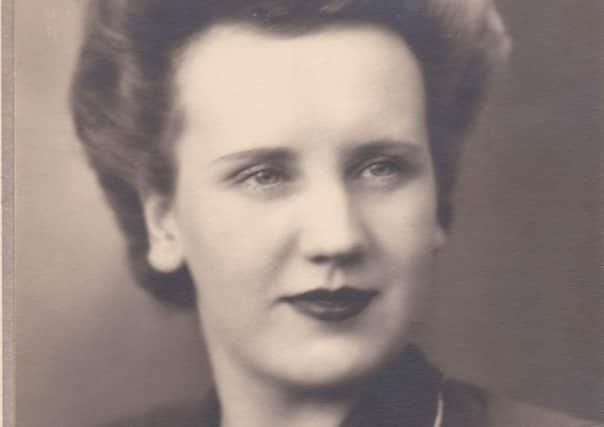Obituary: Bessie Hodgson Watkin, teacher


The only daughter of a well-to-do manufacturing family in Yorkshire’s industrial Spen Valley, she was educated at the Wheelwright Grammar School for Girls in Dewsbury, where the teaching staff were almost exclusively graduates of the women’s colleges of Oxford and Cambridge.
It was presumed by her parents that after matriculation, her school days would be over. But whilst spending time with a Dutch family on their yacht the following year, Bessie decided against the life of idle sociability which would have been normal for girls of her background at the time. She returned to school and two years later passed the Higher School Certificate and gained undergraduate entry to the Leeds University Law Faculty.
Advertisement
Hide AdAdvertisement
Hide AdA keen motorist all her life, she began early by driving herself the 20-mile round trip between Leeds and her home every day of term in her own car. Upon the outbreak of war, her driving skills led her to join the Mechanised Transport Corps, a uniformed women’s organisation which provided chauffeured cars to ferry Whitehall mandarins. This very often involved driving in the dark during the blackout, with pin-hole headlights – an adventure she seemed to relish.
On completion of her degree course, she was offered a position in the Judge Advocate General’s Department, but rejected it as a “cushy number” and not in the spirit of war-time “mucking in”. Instead, she joined the Army’s women’s service, and would later recall the social life it opened up to her – playing tennis with Lady Mary Egerton, Princess Elizabeth’s lady-in-waiting.
After a specialist signals course, she was posted to “Y Group” at Beaumanor Hall in Leicestershire, a secretive organisation whose operations, along with those of the codebreakers at Bletchley Park in Buckinghamshire, have only recently come to public attention. Encrypted enemy signals in Morse code were intercepted by Y Group and sent daily to Bletchley by motorbike courier for decoding.
Though embarrassed to be treated as a Bletchley veteran Bessie consented in her early 90s to a public talk, omitting to mention the details she had confided to her family about the climate of distrust and suspicion which surrounded personnel engaged in such sensitive activities.
Advertisement
Hide AdAdvertisement
Hide AdShe was next posted to an Army Ordnance Corps unit, promoted to Junior Commander (Captain) and appointed assistant to the Commandant, who saw to it that the initials after her name were posted on her door plaque. It was helpful, she said, in persuading the mostly male officers that she was to be taken seriously.
After VE Day, she married Robert Philip Watkin, a lawyer whom she had met at Leeds University. They had become engaged by an exchange of letters while he was serving in India as an officer in the Sikh Light Infantry. After an autumn wedding in Yorkshire and a brief honeymoon, he returned to his regiment as the war there continued.
Bessie followed him to Northern Nigeria, where he had been sent by the Colonial Service, and was one of the last English women to accompany her husband “on tour”, as for several weeks at a time they and an entourage travelled from village to village on horseback, inspecting the territory allocated to his supervision. She remembered being stalked by an ostrich and sleeping in a JuJu hut decorated with the skulls of a village Headman’s ancestors.
When they were there, Bessie and her husband read for the Bar by correspondence course, completing their studies on returning to England in the early 1950s. By now a mother of two and burdened for the first time in her life with ordinary domestic duties, she decided against immediately pursuing a legal career – a decision she always regretted. However, when in 1957 her daughters went to boarding school, she found a teaching role at Mount St Mary’s College, a large direct grant Roman Catholic Grammar School at Richmond Hill in Leeds, founded and run by a French order of teaching nuns. She would go on to teach in a small private school and later in a former grammar that had gone comprehensive.
Advertisement
Hide AdAdvertisement
Hide AdHer experience and her legal credentials saw her appointed chair of the Governors of Skipton Girls’ High School, and a governor of the nearby Ermysted’s Grammar for Boys, both of which she helped remain outside the comprehensive system.
She was also co-opted on to North Yorkshire County Council as added Member for Education, and served from the mid 1970s to the early 1980s, doing much to promote the cause of continued selective education in the county. She resigned her public positions when she reached 60.
Her interests were current affairs, animal welfare and fine art and crafts, which she shared with her husband.
Widowed in 2005, after 59 years of marriage, she is survived by her two daughters, a granddaughter and two great grandchildren.
Comment Guidelines
National World encourages reader discussion on our stories. User feedback, insights and back-and-forth exchanges add a rich layer of context to reporting. Please review our Community Guidelines before commenting.